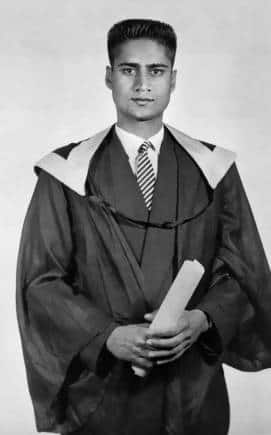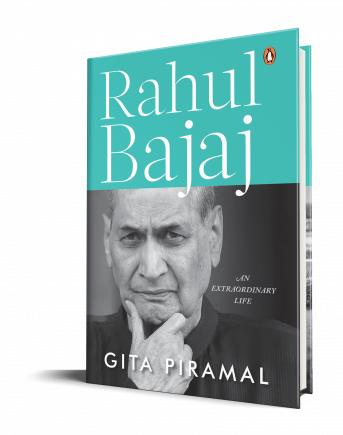



Rahul Bajaj passed away just a few weeks before his biography - Rahul Bajaj: An Extraordinary Life by Gita Piramal - was released on March 21, 2022. Piramal had, of course, known Bajaj for a long time, and had written briefly about his leadership style in Business Maharajas in the 1990s. Her new book offers still deeper insights into the life and contributions of Rahul Bajaj.
The book starts from the beginning, as biographies are wont to do. We get a glimpse into Bajaj's formative years and education at St Stephen's College and then Harvard Business School; how he met his wife Rupa and their life in Boston; and the family's return to Akurdi. And of course Bajaj's contributions to business over the next six decades.
 (from 'Rahul Bajaj: An Extraordinary Life' by Gita Piramal)
(from 'Rahul Bajaj: An Extraordinary Life' by Gita Piramal)There are nuggets here for Indian history buffs and business history enthusiasts in equal measure.
(Bajaj, we are told, was named by Prime Minister Jawaharlal Nehru. And it is well-known that Bajaj's grandfather, Jamnalal Bajaj; father Kamalnayan; and mother Savitri were all freedom fighters. Throughout the 1960s, '70s, '80s, '90s, 2000s, and 2010s, Bajaj was responding to the economic and political climate of the country - his earlier resistance to liberalization is well-known, but there are countless other ways in which his business and personal journeys offer a ringside view of developments in India and Indian industry through these decades.)
Journalist and business historian Gita Piramal gives us a fuller picture of Rahul Bajaj, through anecdotes and interview. The book shines a light (mostly) on the things he did well, but also highlights some areas of business (like investment in R&D, and the shift to motorcycles) where he was a bit slow to make changes.
By using anecdotes as a way to propel Bajaj's story, Piramal offers a perspective on Rahul Bajaj as she and others close to him knew him. She also gives readers the option to read the book cover-to-cover or skip to the bits or periods they find interesting.
Excerpted below is a section from the biography that is built using such interviews and anecdotes, to convey Bajaj's combination of seemingly endless energy and calm focus. Those who knew Bajaj also spoke of his ability to defuse tense situations and his people skills - both of which are also evident to some degree in this section, excerpted from the chapter "God Is in the Detail: 1968–90":
The Patient ListenerPhysically, Bajaj can never stay still. Arms wheel and fly. Toes tap. Mentally, he can be as calm as a pond without ripples when required, and his advice rarely what recipients expect to hear. A couple of examples are included below:
‘One of the Bajaj companies had an ongoing dispute with mine,’ wrote Shyam Ruia. ‘Needless to say, no solution was in sight, and we felt that the staff of the Bajaj company was being quite unreasonable. I’m sure they felt the same about us. As a legal dispute between our families was quite out of the question, the only option was arbitration. It was then that I thought of Rahul as the arbitrator. His decision was overwhelmingly in our favour.’
Staring at a face-off with Datta Samant, Mumbai’s feisty trade union leader in the 1980s, a harried Hariprasad Anandkishore Nevatia, managing director of Hercules Hoists, a Bajaj group firm, reached out to Bajaj for advice and solace.
 ‘The trade union leader workers of Hercules Hoists had become very unruly,’ recalls Nevatia. ‘In 1981/82 while negotiating a settlement, I agreed for a burden of Rs 10 lakh per annum (p.a.) to avoid closure. However, I had to step-by-step increase it to Rs 13 lakh per annum. Finally, when the agreement was to be signed, the workmen insisted the figure be raised to Rs 13.50 lakh. The atmosphere in the factory had grown very tense. As suggested by Shri Ramkrishnaji, I along with Purshottam ji Jhunjhunwala met Rahul bhai to seek his advice. After listening to all the details patiently, Rahul bhai said that it was not a question of 50,000, but if you now agree, the workmen may ask more and even if they do not, it will become difficult for you to run the factory. Closure of the factory for ten months followed. It was reopened on our terms. Though it was a very painful experience, our relationship with workmen radically changed and we could handle the situation with greater confidence. It also helped in all future negotiations. Rahul bhai is a very attentive listener.’
‘The trade union leader workers of Hercules Hoists had become very unruly,’ recalls Nevatia. ‘In 1981/82 while negotiating a settlement, I agreed for a burden of Rs 10 lakh per annum (p.a.) to avoid closure. However, I had to step-by-step increase it to Rs 13 lakh per annum. Finally, when the agreement was to be signed, the workmen insisted the figure be raised to Rs 13.50 lakh. The atmosphere in the factory had grown very tense. As suggested by Shri Ramkrishnaji, I along with Purshottam ji Jhunjhunwala met Rahul bhai to seek his advice. After listening to all the details patiently, Rahul bhai said that it was not a question of 50,000, but if you now agree, the workmen may ask more and even if they do not, it will become difficult for you to run the factory. Closure of the factory for ten months followed. It was reopened on our terms. Though it was a very painful experience, our relationship with workmen radically changed and we could handle the situation with greater confidence. It also helped in all future negotiations. Rahul bhai is a very attentive listener.’
‘I find two things most striking about Rahul,’ concludes Anami N. Roy, Director General of Police, Maharashtra, India and the former Police Commissioner of Mumbai. ‘One is his belief that “God is in the detail”. Whatever he undertakes, he must go into its roots, acquire thorough knowledge, and partly inflict that information on his family and at least a few friends. And the other is his capacity to say “NO”. He can singularly say “no” to the highest and mightiest for anything and everything. Many of us public servants have been told about the abominable “No, man!” in our training academies, who find ourselves in situations required to say “no”, and thereby face a lot of flak and “consequences”. But Rahul, the lucky one, has none of it all.’
Excerpted from Rahul Bajaj: An Extraordinary Life by Gita Piramal, with permission from Penguin Random House.Discover the latest Business News, Sensex, and Nifty updates. Obtain Personal Finance insights, tax queries, and expert opinions on Moneycontrol or download the Moneycontrol App to stay updated!
Find the best of Al News in one place, specially curated for you every weekend.
Stay on top of the latest tech trends and biggest startup news.